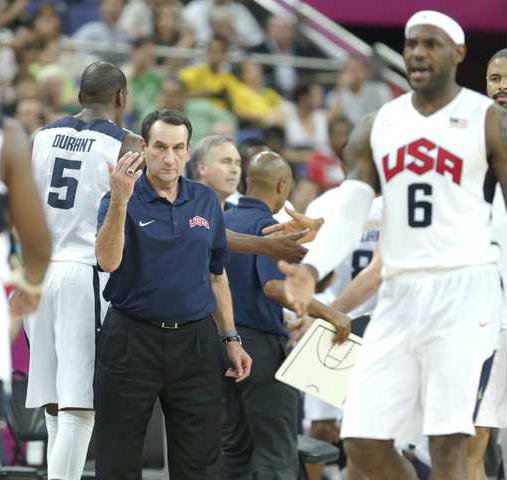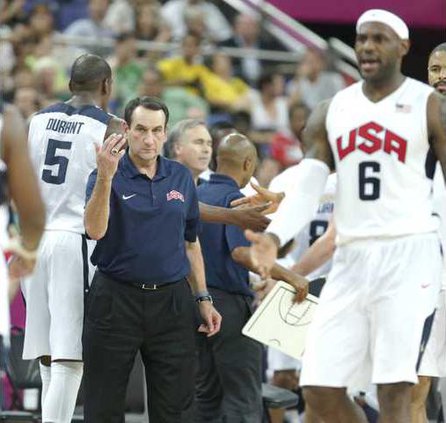LONDON (AP) — Mike Krzyzewski’s job is nearly finished.
Seven years after taking over a USA team that had been stripped of its power and grip on Olympic basketball, Krzyzewski is down to one more game.
But before his players take the court today against Spain, he’ll do what he always does. He will remind them to talk on defense. Share the ball. Play with pride. Represent their families and country with honor.
When it ends, before he takes his own final bow, he’ll also remind them to accept their medals with humility.
The game against Spain is a rematch of the gold-medal game four years ago in China won by the Americans.
Win, and Krzyzewski walks away with an unmatched legacy.
He had left open the possibility that he’d stay on beyond the London Games, but Krzyzewski told the Associated Press before practice on Saturday that he’s stepping down.
Three times, Krzyzewski answered “yeah” when asked if he was finished.
Still, USA Basketball chairman Jerry Colangelo, who hired Krzyzewski in 2005, isn’t going to let him leave without a fight. He plans to take another shot at persuading Krzyzewski to stay.
“He’s said this is it and I’ll respect his choice,” Colangelo said. “But knowing me as I know me, I’ll have that conversation and we’ll see.”
If this is indeed his last game, the 65-year-old Krzyzewski will leave having met every expectation.
With a win, Krzyzewski will join Henry Iba (1964 and 1968) as the only United States coaches to lead teams to consecutive Olympic gold medals. However, Iba, for all his successes, didn’t have to worry about convincing NBA superstars to buy into his program, juggle the demands of coaching one of the nation’s top college teams or compete with an international basketball community filled with talented players.
Krzyzewski’s selection as national coach in 2005 was viewed as risky by some. There were doubts if the Duke coach would be able to get the top pros — players accustomed to always getting their way — to accept a team-first concept. And, with a limited time to get them ready, could he get them to learn the more fluid international game.
With one gold medal — maybe a second — and a world championship on his resume since 2010, Krzyzewski has succeeded on every level.
“He’s been able to build kind of a blueprint, a model, for future coaches in terms of how they deal with players,” said Kobe Bryant, one of five holdovers from the 2008 gold medal winner. “In terms of scheduling, in terms of commitment, he’s kind of established the mold for the next coach.
“His ability to communicate with players individually has been fantastic. His ability to constantly keep things fresh and motivate, that’s something that we’ve appreciated.”
If Colangelo’s the architect of the USA program’s reconstruction, Krzyzewski’s the general contractor.
He’s built it back to where it was in 2000, when the United States won its third straight gold at the Sydney Games. Then came 2004, when the Americans, coached by Larry Browns, lost three games in Greece and settled for bronze, finishing behind Italy and Argentina. The result was shocking.
“We were garbage,” Carmelo Anthony said recently.
Not long after, Colangelo, the former owner Phoenix Suns who had been named head of USA Basketball, immediately began his search for a coach to bring America back. With a few personal favorites in mind, he put together a committee, which presented him with a list 30 NBA and college coaches.
As the group surveyed the names on a board in Chicago, North Carolina coach Dean Smith, who guided the United States Olympic team to gold in 1976, spoke up.
“We talked about each one of them, and Dean Smith says there’s only one college coach up there who could do it, and it’s Coach K,” Colangelo recalled. “That was his biggest rival. Think of that. That was one of those moments.”
There have been others since.
Colangelo, who deserves credit for getting Bryant, Anthony, LeBron James and Chris Paul — the core of the American team — to commit for more than one Olympics, is effusive in his praise of Krzyzewski.
“He was the right guy at the right time,” Colangelo said. “He’s been so important to me in everything we’ve done in building the infrastructure and philosophy and standards — all of it. His legacy goes beyond the record on the court. We’re 52-1 since this all began, and hopefully we’ll be 53-1 after tomorrow. That’s a legacy in itself.
“I really love him and respect him.”
The feeling is mutual. Krzyzewski believes Colangelo deserves his own gold medal.
“He’s the biggest difference for USA basketball,” Krzyzewski said. “I don’t know when the time comes and he has to give it up how he’ll be replaced. You can replace a coach and you can replace players. But what he’s done, I think he is the most irreplaceable part of this.”
The two men have re-established the USA gold standard together, and Colangelo isn’t the only one who can’t imagine where United States basketball might be if not for Krzyzewski’s imprint.
Coaches don’t receive Olympic medals, but when the Americans beat Spain four years ago in China, all 12 American players draped their awards around Krzyzewski’s neck. It was their way of expressing gratitude to a coach who had pulled them together and pushed Team USA back to the top.
Krzyzewski plans to stay with USA basketball after he’s done coaching. To him, it would be a mistake not to utilize what he’s learned during this seven-year run.
“I’ll be involved,” he said. “One thing we screw up in college is when a John Thompson retires or Bob Knight or Dean Smith, we don’t use their institutional memory in any way unless they get on TV or whatever, and it’s really a violation ... of something. It’s really stupid that institutional memory is not used, and we’ll try to do that with USA basketball.
“If you were in music, you would have wanted somebody who had played that instrument for 40 or 50 years and played it well. That’s what we’re trying to do.”
Krzyzewski has done his part.
He’s got one more game, his last note.
Todays game to be last for USA head coach Krzyzewski
2012 Summer Olympics





